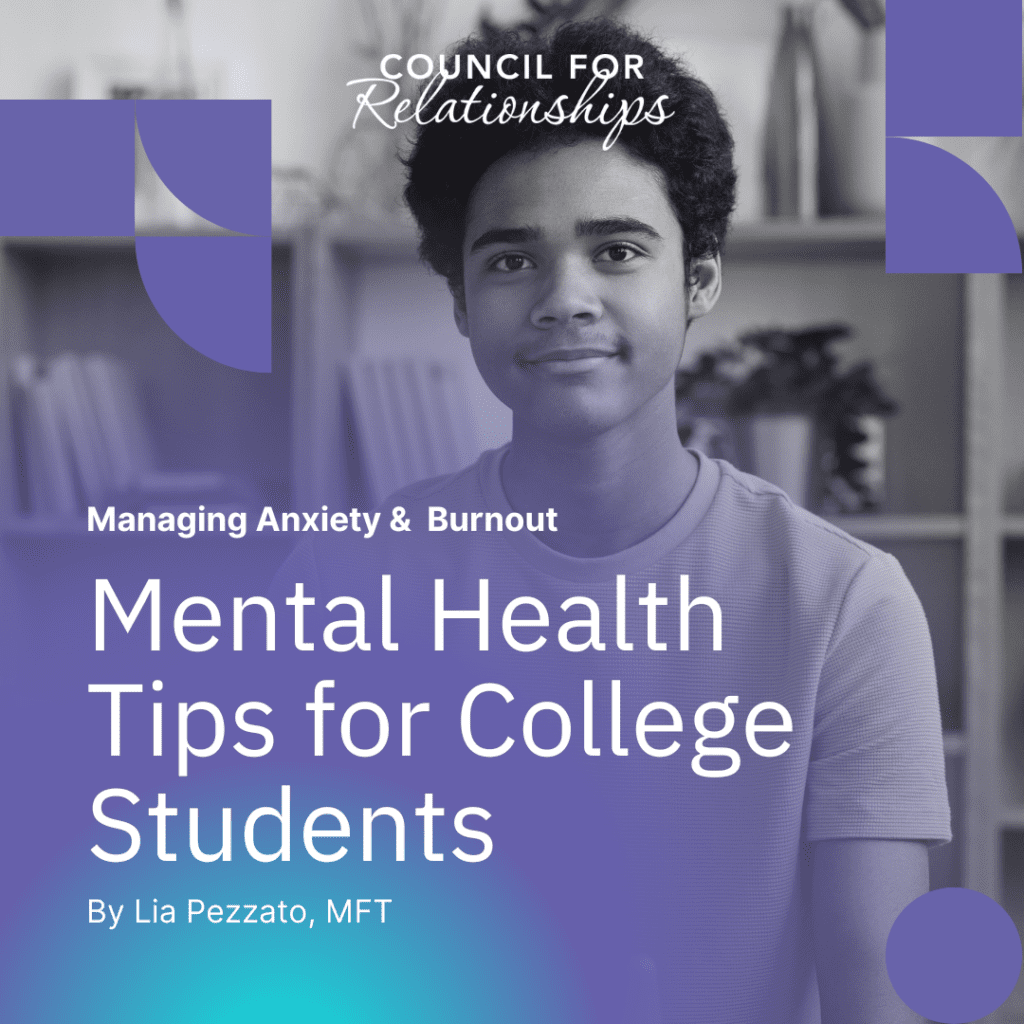Managing Anxiety & Burnout: Mental Health Tips for College Students
Many students feel the weight of balancing classes, extracurriculars, and social activities as the school year progresses. While some may navigate these demands with ease, others struggle with anxiety and burnout. CFR Staff Therapist Lia Pezzato, MFT, offers mental health tips for college students to help manage these common challenges.
In this blog, Lia outlines practical ways to recognize the signs of anxiety and shares effective techniques to cope with stress before it leads to burnout. Whether you’re a student feeling overwhelmed or a parent or school administrator looking for advice, Lia’s mental health tips for college students can help you find balance and peace during the school year.
Jump Forward
- Recognizing Anxiety
- Grounding Techniques for Anxiety
- Managing Anxious Thoughts
- Everyday Practices to Prevent Burnout
- Prioritize Self-Care
- About Voorhees, NJ, and Philadelphia Therapist Lia Pezzato, MFT
The school year is in full swing, and while some students might feel excited, others may find it overwhelming. Managing time, balancing schoolwork, and handling social situations like joining new clubs, navigating dorm life, or figuring out a work-study schedule can increase stress and anxiety. Below, we explore mental health tips for college students to recognize anxiety, cope with stress, and prevent burnout.
Recognizing Anxiety
Anxiety can show up in many different ways. For example, you might feel anxious about meeting deadlines, wondering if you’ll fit in socially, or dealing with the pressure to maintain a scholarship. Here are some common signs:
- Difficulty sleeping due to worries about assignments or exams
- Overthinking decisions, like choosing a major or picking the right extracurriculars
- Fearing the worst possible outcomes, such as failing a class or losing financial aid
- Physical symptoms like a pit in the stomach, headaches, or shaky hands before a presentation
- Trouble breathing when thinking about upcoming exams or projects
- Guilt or low self-esteem for not meeting high expectations
- Struggling to finish tasks because you feel overwhelmed
- Worrying about the past or future, like regretting missed opportunities or fearing post-college uncertainty
- Obsessive thoughts about grades, social acceptance, or future career prospects
If you’re experiencing any of these symptoms, it’s essential to acknowledge them and take steps to manage your anxiety.
Grounding Techniques for Anxiety: Mental Health Tips for College Students
Before tackling anxious thoughts, it’s crucial to regulate your body. Here are a few techniques:
54321 Senses Method for College Students
Identify:
- Five things you can see in your dorm or campus environment
- Four things you can touch, like your laptop or textbooks
- Three things you can hear, whether it’s background music or campus chatter
- Two things you can smell, like coffee brewing or your favorite snack
- One thing you can taste, such as a mint or water
Regulated Breathing for College Stress
Breathe in through your nose for 5 seconds, hold for 5 seconds, and breathe out through your mouth for 5 seconds. Repeat this cycle to help calm your body, whether you’re anxious before a big exam or struggling to concentrate in class.
Leaves on a Stream: A Visualization for Students
Imagine sitting by a peaceful stream. Picture your anxious thoughts about assignments, relationships, or the future as leaves float by. Visualize placing each thought on a leaf and watching it drift away down the stream. This visualization can help create distance between you and your worries, making focusing on the present moment easier.
Managing Anxious Thoughts: Mental Health Tips for College Students
Once you’ve calmed your body, you can begin addressing anxious thoughts. Feeling stressed about academics, social life, or career plans is expected. Still, mental health tips for college students, like cognitive restructuring and the worst-case scenario technique, can help manage these worries more effectively.
Worst Case, Best Case, and Most Likely
Ask yourself:
- What’s the worst that could happen if you don’t ace your exam?
- What’s the best possible outcome if you try out for that club?
- What’s the most likely scenario if you struggle to balance classes and a part-time job?
Breaking down your fears this way can help them feel more manageable.
Cognitive Restructuring for College Students
Ask yourself:
- Is there proof to support this worry about failing or being left out?
- Could there be another explanation, like feeling burnt out or overly stressed?
- How would someone else view this situation?
These questions can help reframe negative thoughts and reduce anxiety, especially when social or academic pressure feels overwhelming.
Everyday Practices to Prevent Burnout: Mental Health Tips for College Students
Anxiety often builds up over time, leading to burnout. To prevent this, building routines that work for you is vital.
Create a Structured Work Schedule
College students juggle various responsibilities, from classes and part-time jobs to extracurriculars. Creating a schedule can help reduce stress. Break tasks into smaller goals, such as working on one section of an essay each day.
Use a planner or phone reminders to stay organized. Remember to schedule breaks, such as taking a 5-minute rest after 30 minutes of work or rewarding yourself with time on social media after finishing a study session.
Use Available Supports
Don’t hesitate to ask for help if you’re struggling with schoolwork. Your professors, tutors, and campus resources are there to support you. It’s okay to seek assistance—it’s part of the learning process.
Most colleges also offer mental health services, a great resource if you feel emotionally overwhelmed. Speaking with a campus counselor can help you manage stress, whether adjusting to college life or dealing with homesickness.
Prioritize Self-Care: Mental Health Tips for College Students
Success in college isn’t just about getting good grades. It’s also a time to gain independence, build relationships, and discover your passions and identity.
To do this, you need to balance academics with self-care. Schedule time for studying, resting, and socializing. Your body and mind need a variety of activities to stay healthy.
You might set aside a few hours after class for schoolwork, then block off the rest of your day to hang out with friends, relax at a campus event, or engage in hobbies like exercising or gaming.
It’s easy to overwork yourself until you feel burnt out, but authentic self-care means building daily habits that give you the rest you need before you reach that point. Having a routine can help you manage your anxiety and stress more effectively.
By practicing these mental health tips for college students, you can manage anxiety and stress during the school year. Remember that anxiety is a normal feeling, but there are effective ways to address it. If you’re struggling, don’t hesitate to reach out for help, as many resources are available to support your mental health journey.
More Expert Voices: Mental Health Tips for College Students
Looking for more ways to manage stress and anxiety during the school year? CFR’s therapists and mental health experts provide valuable insights on topics that affect college students, from coping with the pressures of academics to finding balance in your daily life. Explore the CFR Expert Voices blog for more mental health tips for college students, including advice on managing relationships, building healthy habits, managing stress levels, and maintaining self-care routines.
Whether you’re looking for strategies to handle overwhelming coursework or ways to improve your mental well-being, our experts offer practical solutions to help you personally and academically thrive. Our Therapists and Psychiatrists are here to provide you with the best mental health support.
Stay informed and get more tips directly to your inbox! Sign up for our mailing list to receive the latest mental health advice, stress management strategies, and student resources throughout the school year.
Impact of Suicide Jokes on Mental Health: Supporting Peers and Preventing Crisis


